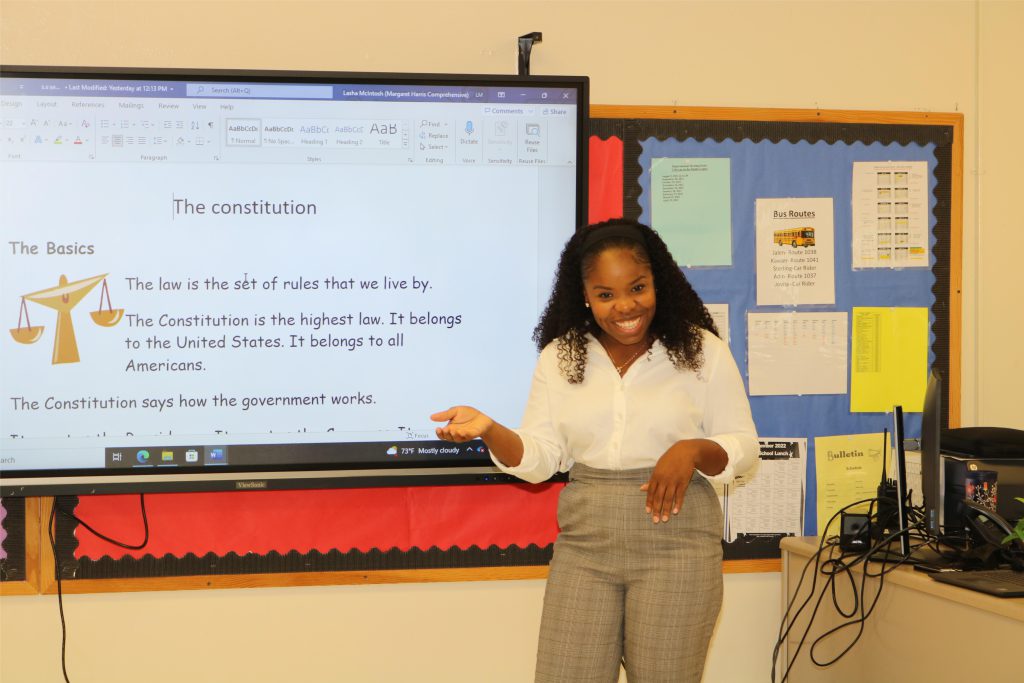DCSD Provides Creative Path for Paraprofessionals to
Realize Dreams of Becoming Fully Certified, Fully Engaged Educators
The ‘Grow Your Own Program Initiative’ Is Already Making a Difference
 It’s no secret that school districts compete to attract and retain teachers in an ever-challenging pool of qualified candidates. The DeKalb County School District (DCSD) didn’t have to look far to find an incredibly talented and committed group of educators already part of the District family: Our paraprofessionals! All that remained was to create a pipeline to full teaching certification for paras choosing to pursue it.
It’s no secret that school districts compete to attract and retain teachers in an ever-challenging pool of qualified candidates. The DeKalb County School District (DCSD) didn’t have to look far to find an incredibly talented and committed group of educators already part of the District family: Our paraprofessionals! All that remained was to create a pipeline to full teaching certification for paras choosing to pursue it.
The result was the innovative “Grow Your Own Para to Teacher Initiative,” which allows the district and its colleges and university partners to develop paraprofessionals into fully certified teachers. This new program even offers scholarship opportunities from program providers, financial aid assistance, transcript evaluations, professional learning opportunities, Georgia Assessments for the Certification of Educators (GACE) study sessions, and in-person and virtual meetings with DCSD human resource leaders to seamlessly assist with the certification requirements.
“Our ‘Grow Your Own’ initiative is a great opportunity for paraprofessionals to bloom and grow,” said Dr. Angelica Collins, Director of Human Resources and Employment Services for DCSD. “We are excited to be able to offer this program.
“This opportunity provides them with a roadmap to success.”
Completers of the initiative say it was all worth the effort.
“I really enjoyed being a para. It made me realize how important educators are in students’ lives and the level of positive influence that we have on them,” said Ms. Lasha McIntosh, a teacher at Margaret Harris Comprehensive School. “I wanted to maximize my potential to help students to the best of my ability. To accomplish that, I had to become a teacher.”
Margaret Harris Comprehensive School Principal, Ms. Keisha Sims, said Ms. McIntosh is one of three former paraprofessionals with college degrees in other disciplines, but they dedicated themselves to becoming educators.
“What I found that made them outstanding teachers were their hearts. If you don’t have the heart for this [student] population, then you cannot work with this population,” Principal Sims said. “Because they were already here, committed, and showed an interest in our students, the transition was almost seamless.”
“[Ms. McIntosh] exceeds all expectations. I knew that taking her from a para to a teaching position would be an asset. She was an ideal candidate for the transition with her energy, commitment, and passion.”
Ms. Stephanie Philips-Capers, a teacher at DeKalb Elementary School of the Arts, is another former paraprofessional at the school with a college degree in another field (economics) and switched to education.
“I tutored math during my senior year of college and seeing the positive results from my tutoring was very encouraging,” Ms. Philips-Capers said. “I saw that making a difference was what I needed to do.”
“With the encouragement of great leaders at DeKalb Elementary School of the Arts, I decided to take that leap from paraprofessional to teacher,” Ms. Philips-Capers said. “I believed I would be doing the same—helping children to grow academically, mentally, and emotionally. It had been enlightening and very fulfilling.”
DeKalb Schools has more than 1,400 paraprofessionals in 139 schools and centers who provide positive student guidance, attending to their physical needs, academics, and emotional well-being. Paraprofessionals also provide much-needed support during instruction time, enabling them to develop the essential skills needed to become highly effective teachers.
The district partners include Georgia College and State University, Kennesaw State University, Mercer University, Teacher Ready, Clayton State University, and others that help paraprofessionals transition to teachers.
At the end of the day, it’s about preparing teachers to be their very best as they focus on keeping students first. Ms. Sims hopes the District continues its commitment to the “Grow Your Own Para to Teacher Initiative” because it created a path for herself and others to become classroom leaders.
“Paraprofessionals are the foundation of great teachers,” she said. “You can’t just walk in and be a good teacher. You need that hands-on experience. That’s why being a para absolutely helped us to transition these new teachers.”
Ms. McIntosh, now one of five former Margaret Harris Comprehensive School paraprofessionals who is now certified teachers at the school, has a Bachelor of Science degree in Human Services from Empire State College and worked as a case manager for a year prior to becoming a paraprofessional. She will begin her master’s program in the spring, focusing on special education.
She doesn’t regret her decision to become a full-time certified teacher one bit.
“I have challenges, of course, and I know that comes with my new role. However, I can take on these challenges head-on because of the numerous resources, information, and support my administrators have put in place to assist new teachers in having a successful first year,” she said.
